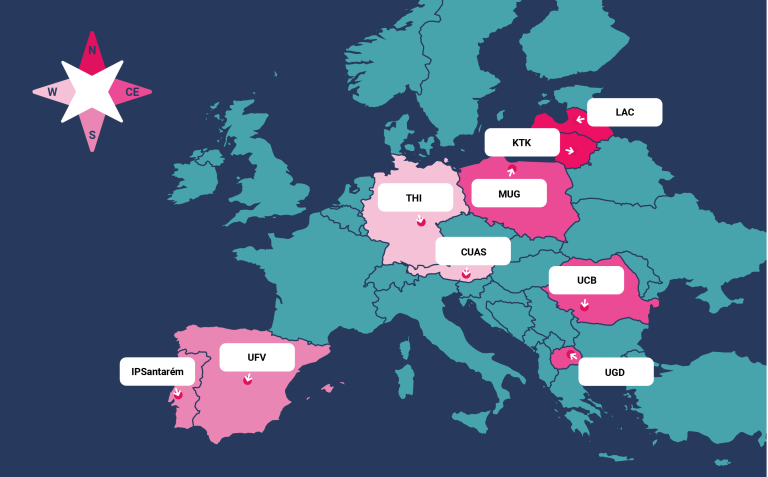The nine-member Universities of ACE2-EU are drawn from a broad range of different types of higher education institutions across Europe (including the West Balkans) and include Research Universities, Universities of Applied Sciences, Polytechnic Universities, Medical Universities and Universities of Culture and Arts. We deliberately decided to combine a broad range of university types from different national and cultural contexts in Europe as it allows us to:
- Expose our students, staff, and other stakeholders to the broadest possible spectrum of university, cultural, and linguistic environments while participating in our joint learning opportunities, thereby allowing them to take advantage of the benefits of our diverse higher education settings and pedagogical approaches;
- Establish unique multi-university-type and multidisciplinary, European Knowledge Creation Teams to develop and deliver transdisciplinary solutions to address future challenges;
- Share an extensive range of best practice approaches applied by the different university types of Europe, to the development and delivery of education, research, innovation, and service to society programmes and activities.Although the evolutionary pathway of our member universities differs, their individual and collective primary mission focus aligns. All have extensive and impressive track records in the creation of innovative solutions in partnership with different stakeholders from industry, business, society, and government; focussed on addressing future challenges thereby delivering sustainable societal transformation for the benefit of their stakeholders and society overall. It is this common mission focus that binds, motivates, and drives our alliance members’ collaborative strategy, work plan, and collective efforts.The members of the alliance through their work together and use of collaborative challenge-based and applied approaches in the design and delivery of their joint education, research, innovation, and service to society learning opportunities and activities seek to not only deliver sustainable societal transformation for the benefit of all; they will also drive the continued enhancement of the European Education Area and its associated objectives, principles, and values and in particular the development of European Universities in terms of their quality, international competitiveness, attractiveness, and capacity to act as models of good practice.Before the initiation of ACE2-EU in 2022, our member Universities collaborated with each other on an individual basis and forged strong ties in teaching, research, innovation, service to society, and mobility activities. Since the establishment of ACE2-EU our members have intensified their collective collaborative efforts through:
- The formal establishment of ACE2-EU in 2023;
- The signing of an Erasmus Multilateral Agreement by our member universities;
- The delivery of our first pilot challenge-based programme focussed on improving respect, tolerance and diversity.
Achieving all of the above has required significant collaborative engagement, which has led to the establishment of several working groups and joint teams since the establishment of the alliance, including our Mission, Vision, and Long-Term Strategy Group, and our Presidents/Rectors and Vice- Presidents Steering Group. Our working groups and joint teams have held numerous meetings both online and face-to-face. On top of this, we have initiated the first element of our e-Campus with the establishment of our website.The member Universities of ACE2-EU are drawn from, and evenly distributed across, all the regions of the EU (including having a member from the Balkan countries) to optimise the level of integration, inclusion, multiculturalism, and multilingualism which our European University can provide.

Polytechnic University of Santarém – Alcinda Reis, Ana Loureiro, Paula Pinto, Cláudio Barradas, Cristina Novo, Filipe Madeira, Hélia Dias, José Soares, Margarida Oliveira, Maria Regina Ferreira, Rita Santos Rocha, Susana Franco, Maria Potes Barbas
Carinthia University of Applied Sciences, Austria – Julia Marinccio, Mélissa Pebayle
University Constantin Brâncusi Târgu – Jiu, Romania – Popescu Luminița Georgeta, Corina Dragan, Liviu Cirtina, Mihaela Giurgiulescu, Ștefan Sorinel Ghimiși, Gabriela Dobrotă, Nicolae Ecobici.
Goce Delcev University, North Macedonia – Ana Nikodinovska Krstevska
Kauno Techikos Kolegija, Lithuania –
University Francisco de Vitoria UFV, Spain – Juan Pérez Miranda, Adriaan Kühn
Medical University of Gdansk, Poland – Mateusz Kirjak, Michal Markuszewski
Latvian Academy of Culture, Latvia – Una Bluķe, Ilze Beimane
Technishe Hochschule Ingolstadt, Germany – Daniel Großmann, Overbeck, Georg

